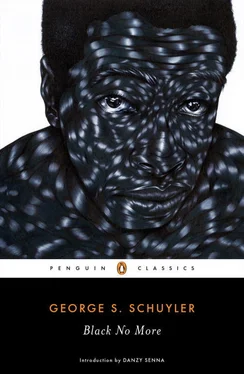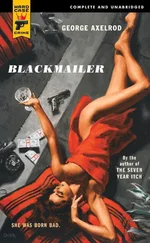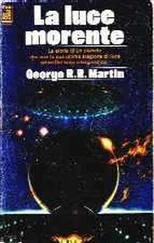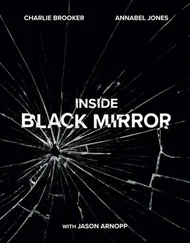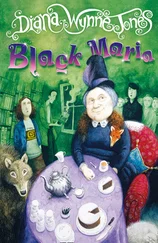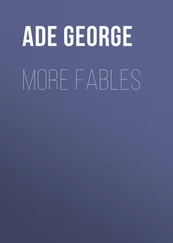Johnson showed all of his many gold teeth in a wide grin as he glanced out the window and saw the queue of Negroes already extending around the corner. “Man, man, man!” he chuckled to Foster, “at fifty dollars a th’ow this thing’s gonna have th’ numbah business beat all hollow.”
“Hope so,” said Foster, gravely.
—
Max Disher, arrayed only in a hospital bathrobe and a pair of slippers, was escorted to the elevator by two white-coated attendants. They got off on the sixth floor and walked to the end of the corridor. Max was trembling with excitement and anxiety. Suppose something should go wrong? Suppose Doc should make a mistake? He thought of the Elks’ excursion every summer to Bear Mountain, the high yellow Minnie and her colorful apartment, the pleasant evenings at the Dahomey Casino doing the latest dances with the brown belles of Harlem, the prancing choruses at the Lafayette Theater, the hours he had whiled away at Boogie’s and the Honky Tonk Club, and he hesitated. Then he envisioned his future as a white man, probably as the husband of the tall blonde from Atlanta, and with firm resolve, he entered the door of the mysterious chamber.
He quailed as he saw the formidable apparatus of sparkling nickel. It resembled a cross between a dentist’s chair and an electric chair. Wires and straps, bars and levers protruded from it and a great nickel headpiece, like the helmet of a knight, hung over it. The room had only a skylight and no sound entered it from the outside. Around the walls were cases of instruments and shelves of bottles filled with strangely colored fluids. He gasped with fright and would have made for the door but the two husky attendants held him firmly, stripped off his robe and bound him in the chair. There was no retreat. It was either the beginning or the end.
Slowly, haltingly, Max Disher dragged his way down the hall to the elevator, supported on either side by an attendant. He felt terribly weak, emptied and nauseated; his skin twitched and was dry and feverish; his insides felt very hot and sore. As the trio walked slowly along the corridor, a blue-green light would ever and anon blaze through one of the doorways as a patient was taken in. There was a low hum and throb of machinery and an acid odor filled the air. Uniformed nurses and attendants hurried back and forth at their tasks. Everything was quiet, swift, efficient, sinister.
He felt so thankful that he had survived the ordeal of that horrible machine so akin to the electric chair. A shudder passed over him at the memory of the hours he had passed in its grip, fed at intervals with revolting concoctions. But when they reached the elevator and he saw himself in the mirror, he was startled, overjoyed. White at last! Gone was the smooth brown complexion. Gone were the slightly full lips and Ethiopian nose. Gone was the nappy hair that he had straightened so meticulously ever since the kink-no-more lotions first wrenched Aframericans from the tyranny and torture of the comb. There would be no more expenditures for skin whiteners; no more discrimination; no more obstacles in his path. He was free! The world was his oyster and he had the open sesame of a pork-colored skin!
The reflection in the mirror gave him new life and strength. He now stood erect, without support, and grinned at the two tall, black attendants. “Well, Boys,” he crowed, “I’m all set now. That machine of Doc’s worked like a charm. Soon’s I get a feed under my belt I’ll be okeh.”
Six hours later, bathed, fed, clean-shaven, spry, blond and jubilant, he emerged from the outpatient ward and tripped gaily down the corridor to the main entrance. He was through with coons, he resolved, from now on. He glanced in a superior manner at the long line of black and brown folk on one side of the corridor, patiently awaiting treatment. He saw many persons whom he knew but none of them recognized him. It thrilled him to feel that he was now indistinguishable from nine-tenths of the people of the United States; one of the great majority. Ah, it was good not to be a Negro any longer!
As he sought to open the front door, the strong arm of a guard restrained him. “Wait a minute,” the man said, “and we’ll help you get through the mob.”
A moment or two later Max found himself the center of a flying wedge of five or six husky special policemen, cleaving through a milling crowd of colored folk. From the top step of the sanitarium he had noticed the crowd spread over the sidewalk, into the street and around the corners. Fifty traffic policemen strained and sweated to keep prospective patients in line and out from under the wheels of taxicabs and trucks.
Finally he reached the curb, exhausted from the jostling and squeezing, only to be set upon by a mob of newspaper photographers and reporters. As the first person to take the treatment, he was naturally the center of attraction for about fifteen of these journalistic gnats. They asked a thousand questions seemingly all at once. What was his name? How did he feel? What was he going to do? Would he marry a white woman? Did he intend to continue living in Harlem?
Max would say nothing. In the first place, he thought to himself, if they’re so anxious to know all this stuff, they ought to be willing to pay for it. He needed money if he was going to be able to thoroughly enjoy being white; why not get some by selling his story? The reporters, male and female, begged him almost with tears in their eyes for a statement but he was adamant.
While they were wrangling, an empty taxicab drove up. Pushing the inquisitive reporters to one side, Max leaped into it and yelled “Central Park!” It was the only place he could think of at the moment. He wanted to have time to compose his mind, to plan the future in this great world of whiteness. As the cab lurched forward, he turned and was astonished to find another occupant, a pretty girl.
“Don’t be scared,” she smiled. “I knew you would want to get away from that mob so I went around the corner and got a cab for you. Come along with me and I’ll get everything fixed up for you. I’m a reporter from The Scimitar. We’ll give you a lot of money for your story.” She talked rapidly. Max’s first impulse had been to jump out of the cab, even at the risk of having to face again the mob of reporters and photographers he had sought to escape, but he changed his mind when he heard mention of money.
“How much?” he asked, eyeing her. She was very comely and he noted that her ankles were well turned.
“Oh, probably a thousand dollars,” she replied.
“Well, that sounds good.” A thousand dollars! What a time he could have with that! Broadway for him as soon as he got paid off.
As they sped down Seventh Avenue, the newsboys were yelling the latest editions. “Ex—try! Ex—try! Blacks turning white! Blacks turning white! … Read all about the gr-r-reat dis—covery! Paper, Mister! Paper! … Read all about Dr. Crookman.”
He settled back while they drove through the park and glanced frequently at the girl by his side. She looked mighty good; wonder could he talk business with her? Might go to dinner and a cabaret. That would be the best way to start.
“What did you say your name was?” he began.
“I didn’t say,” she stalled.
“Well, you have a name, haven’t you?” he persisted.
“Suppose I have?”
“You’re not scared to tell it, are you?”
“Why do you want to know my name?”
“Well, there’s nothing wrong about wanting to know a pretty girl’s name, is there?”
“Well, my name’s Smith, Sybil Smith. Now are you satisfied?”
“Not yet. I want to know something more. How would you like to go to dinner with me tonight?”
“I don’t know and I won’t know until I’ve had the experience.” She smiled coquettishly. Going out with him, she figured, would make the basis of a rattling good story for tomorrow’s paper. “Negro’s first night as a Caucasian!” Fine!
Читать дальше
